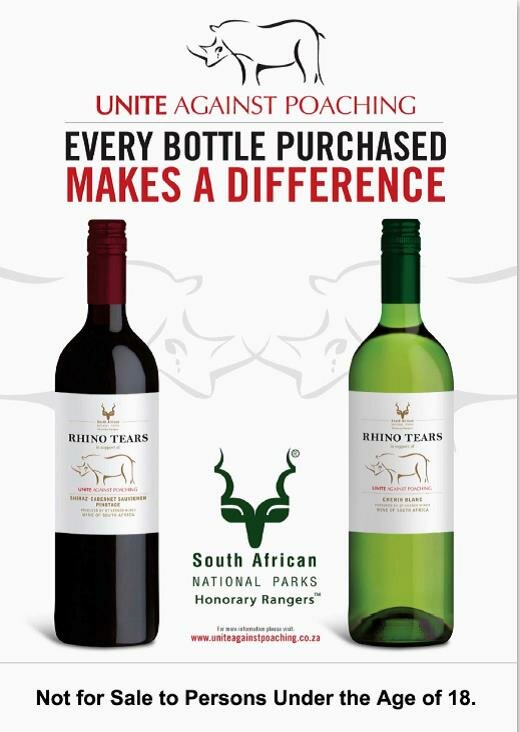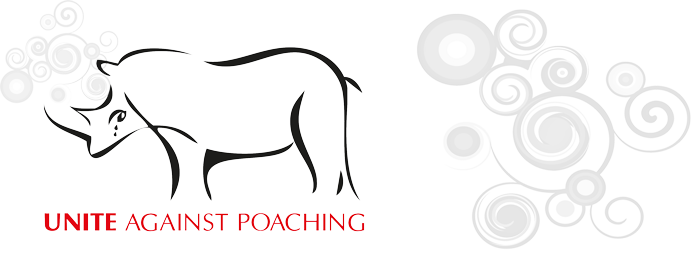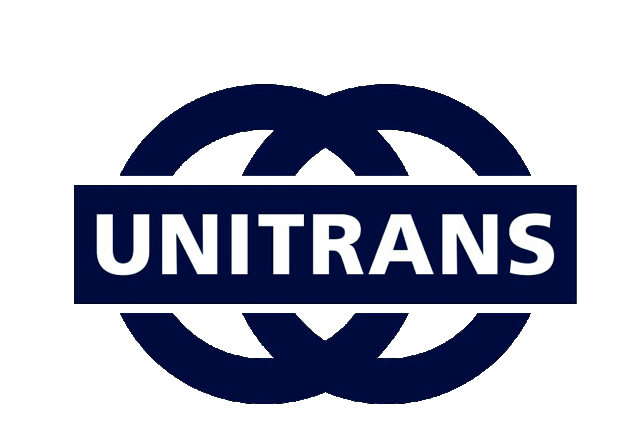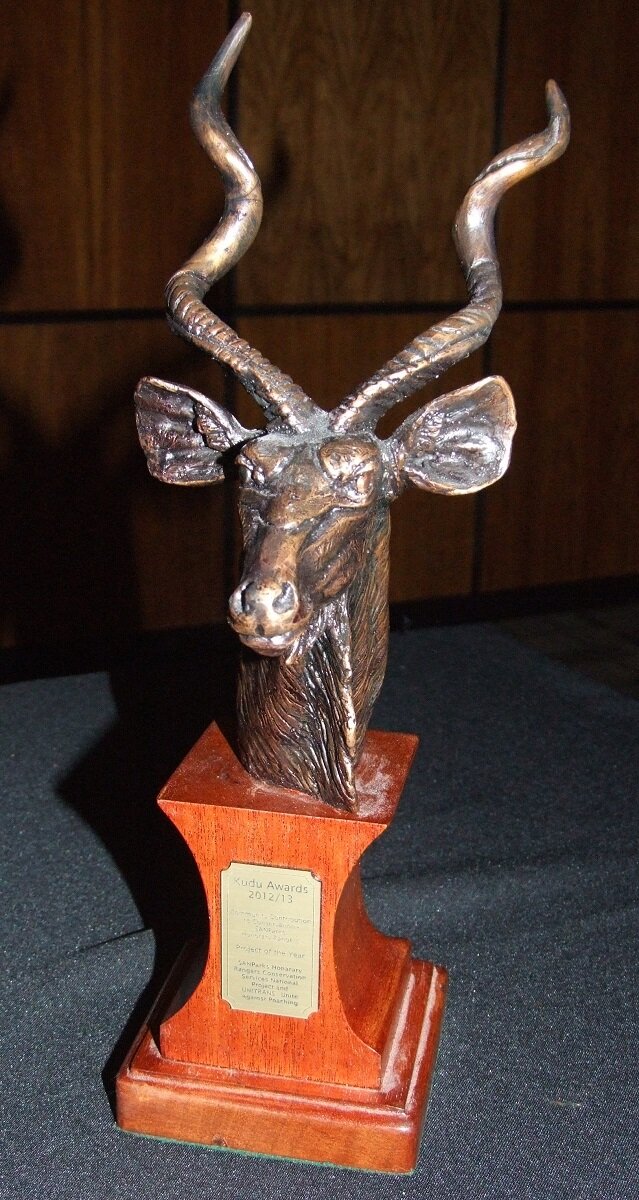RIP Dr Ian Player
Dec 01 2014- Details
-
 Our very sincere condolences on the passing of a legend, to his family, friends and fellow rangers and conservationists. What a giant of a man.
Our very sincere condolences on the passing of a legend, to his family, friends and fellow rangers and conservationists. What a giant of a man.
Unite against Poaching was greatly honoured to receive the blessings and acknowledgement from Dr Player at the inauguration of our initiative in September 2011. Thank you Dr Player for your inspirational message.
We have the greatest respect for his selfless work of a lifetime in bringing the rhino back from the brink of extinction. May we fulfill his legacy and never give up the fight to save our rhinos.
Rest softly, Sir!
South Africa creates rhino stronghold to thwart poachers
Nov 27 2014- Details
-
SKUKUZA, South Africa -- The rhino crashes forward, pounding the earth with its broad feet. Then, as a dart's sedative takes hold, it staggers and slouches to the ground, where South African rangers prepare to move the oversized beast by truck to an area they hope is safe from poachers.
Kruger National Park has conducted about 45 such captures since last month, part of a plan to create a stronghold within the country's flagship reserve where rhinos will get extra protection from poachers, many of whom cross from neighbouring Mozambique and are slaughtering the animals in increasing numbers. Some rhinos were moved to other parks, and the relocation "experiment," as rangers describe it, is likely to escalate next year.
Safe havens or buffer zones have been hotly debated over the years as a way to protect civilians in some of the world's major conflicts. South Africa is applying a variation of the idea to wildlife to try to stem surging demand for rhino horn. Some consumers in Asia, primarily Vietnam and China, view rhino horn as a status symbol and a healing agent despite a lack of evidence that it can cure. The horn is made of keratin, a protein also found in human fingernails.
The so-called "intensive protection zone" in the southern part of Kruger National Park took on new urgency when South Africa, home to 80 per cent of the world's rhinos, announced Thursday that 1,020 rhinos have been poached so far in 2014, exceeding last year's record of 1,004.
Read more: South Africa creates rhino stronghold to thwart poachers
US GOVERNMENT HAND OVER OF $3 million to fund South African anti-wildlife trafficking efforts
Nov 24 2014- Details
-
Simon Bloch
A pledge by President Barack Obama to fund South African anti-wildlife trafficking efforts to the tune of US$3 million will be fulfilled today when the US government commitment is handed over in a ceremony at its Pretoria Embassy in South Africa.
Obama made the pledge during his 2013 trip to Africa.
The funding has been allocated by the U.S. Department of State’s Bureau of International Narcotics and Law Enforcement Affairs (INL).
“We applaud the efforts of the South African government in fighting these crimes and we look forward to continuing to cooperate with it to disrupt the criminal networks involved” said Joy Peters of the US State Department based in Pretoria.
The funding will be handed to the recipients by US Under Secretary for Economic Growth Energy and the Environment, Catherine Novelli.
“The focus her visit to Africa is largely on the environment” Peters said.
“She also recently visited Kenya where she attended the Africa summit in Nairobi, and Tanzania”.
According to a statement released by the State Department yesterday, record-high demand for illegally traded wildlife products, coupled with inadequate preventative measures and weak institutions, has resulted in an explosion of illicit trade in wildlife in recent years.
Like other forms of illicit trade, wildlife trafficking undermines security across nations. Well-armed, well-equipped, and well-organized networks of criminals, insurgent elements, and corrupt officials exploit porous borders and under-resourced institutions to profit from trading in poached wildlife.
“This clearly demonstrates the increased U.S. focus on combatting the scourge of wildlife trafficking, as laid out in the 2014 National Strategy for Combating Wildlife Trafficking” Peters told Independent News Group.
$750,000 worth of survival, surveillance, and investigative equipment has been ring-fenced for South African park rangers at the national and provincial levels to support their efforts to combat poaching and illegal wildlife trafficking.
$2.25 million will specifically fund efforts in South Africa to: assist law enforcement in conducting intelligence-driven investigations;
• build expertise that will help analyze and map the illicit wildlife trade to support proactive targeting of illicit networks;
• improve communications between counterparts in the wildlife and criminal justice communities; and
• assist the Government in building strong partnerships with neighboring African countries and consumer countries in Asia to ensure more regular coordination and the sharing of information related to wildlife trafficking.
RHINO TEARS WINES
Nov 12 2014- Details
-
Breaking news!!!
We are delighted to present Rhino Tears wines.
These 2 delightful drinking wines have been specially crafted by the winemakers at Mount Vernon in support of Unite against Poaching.
For each bottle sold, the winemaker will make a R 15 donation to the Unite against Poaching fund. There has already been a R 200 000 contribution to Unite against Poaching since the launch of this range in December 2014. What a unique way to make a positive contribution to help save our rhinos.
The resulting wines comprise of a good red blend made from Shiraz, Cabernet Sauvignon and Pinotage grapes that allows for easy drinking and appeals to all levels of palate. The white is a delightful fruit driven Chenin Blanc, suitable for enjoying at all occasions
These wines are now available at Macro, Pick N Pay, SPAR, Tops, Fruit n Veg City and major independent retailers.
To order wines directly from the winemaker for delivery anywhere in South Africa please click here and the friendly team will ensure your wine reaches you shortly.
Click here to fill in your order!








 Mitec Solutions
Mitec Solutions